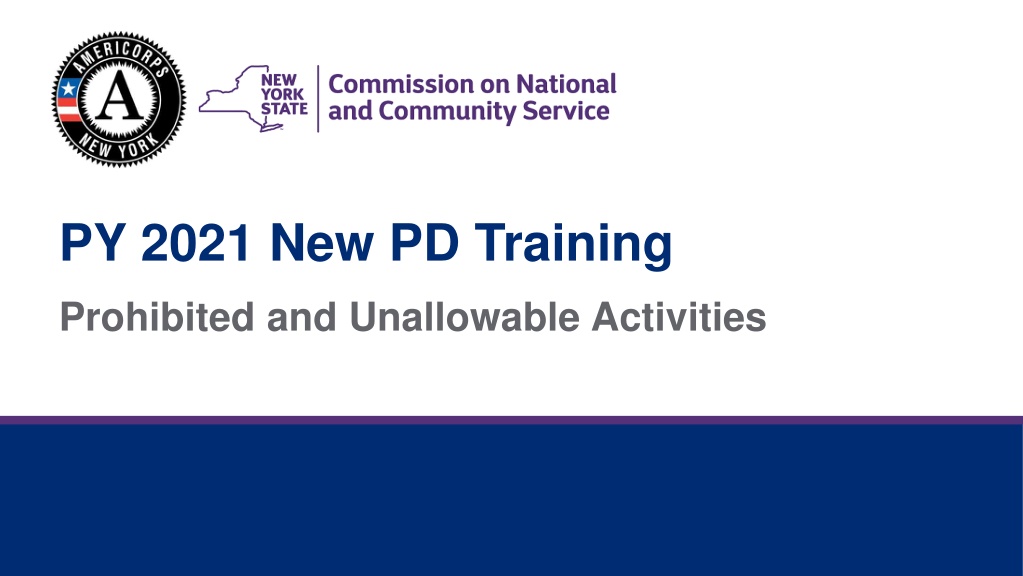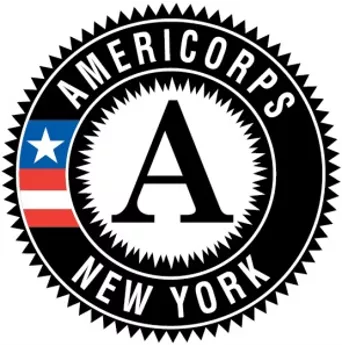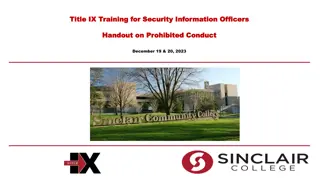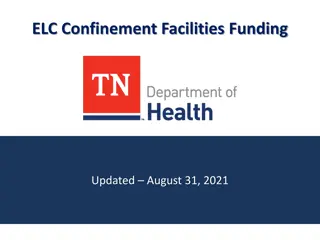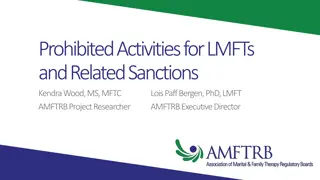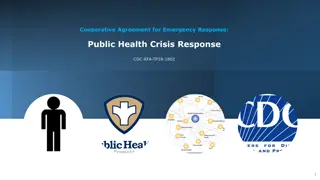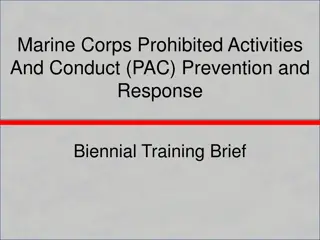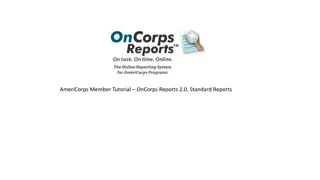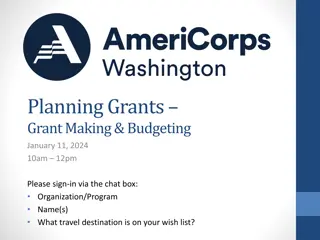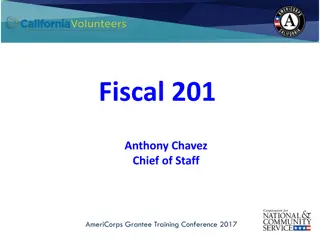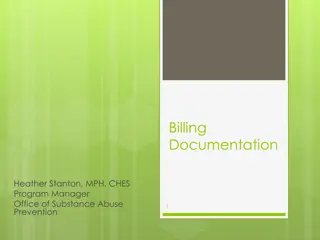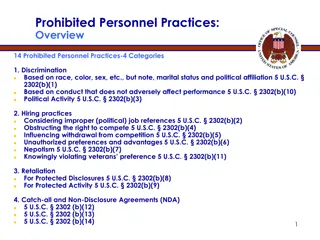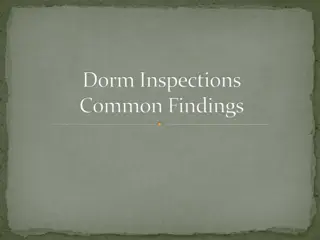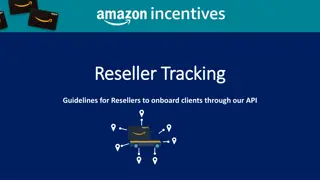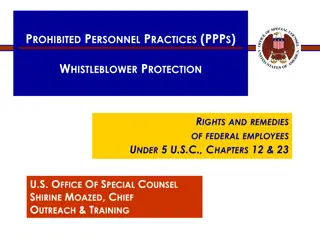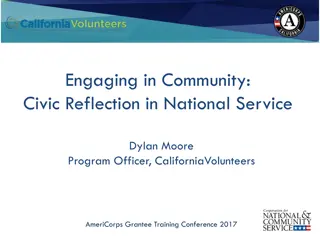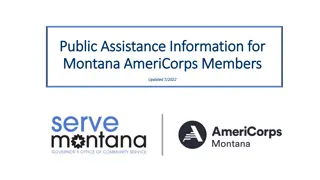Prohibited and Unallowable Activities in AmeriCorps Programs
The content outlines the prohibited activities that staff, members, and volunteers supported by AmeriCorps programs or CNCS grants cannot engage in. These activities range from influencing legislation to partisan political actions, religious proselytization, and providing direct benefits to certain entities. The restrictions apply during hours funded by AmeriCorps grants and encompass a wide range of actions that are deemed inappropriate. Personal time is the only exception where these restrictions do not apply. Compliance with these guidelines is crucial for all involved in AmeriCorps programs.
Download Presentation

Please find below an Image/Link to download the presentation.
The content on the website is provided AS IS for your information and personal use only. It may not be sold, licensed, or shared on other websites without obtaining consent from the author. Download presentation by click this link. If you encounter any issues during the download, it is possible that the publisher has removed the file from their server.
E N D
Presentation Transcript
PY 2021 New PD Training Prohibited and Unallowable Activities
2 Prohibited Activities While charging time to the AmeriCorps program, accumulating service or training hours, or otherwise performing activities supported by the AmeriCorps program or CNCS, staff and members may not engage in the following activities: 1. Attempting to influence legislation; 2. Organizing or engaging in protests, petitions, boycotts, or strikes; 3. Assisting, promoting, or deterring union organizing; 4. Impairing existing contracts for services or collective bargaining agreements; 5. Engaging in partisan political activities, or other activities designed to influence the outcome of an election to any public office; 6. Participating in, or endorsing, events or activities that are likely to include advocacy for or against political parties, political platforms, political candidates, proposed legislation, or elected officials; 7. Engaging in religious instruction, conducting worship services, providing instruction as part of a program that includes mandatory religious instruction or worship, constructing or operating facilities devoted to religious instruction or worship, maintaining facilities primarily or inherently devoted to religious instruction or worship, or engaging in any form of religious proselytization;
3 Prohibited Activities Continued 8. Providing a direct benefit to a. A business organized for profit; b. A labor union; c. A partisan political organization; d. A nonprofit organization that fails to comply with the restrictions contained in section 501(c)(3) of the Internal Revenue Code of 1986 related to engaging in political activities or substantial amount of lobbying except that nothing in these provisions shall be construed to prevent participants from engaging in advocacy activities undertaken at their own initiative; and e. An organization engaged in the religious activities described in paragraph C. 7. above, unless CNCS assistance is not used to support those religious activities; 9. Conducting a voter registration drive or using CNCS funds to conduct a voter registration drive; 10. Providing abortion services or referrals for receipt of such services; and 11. Such other activities as CNCS may prohibit. 45 CFR 2520.65 - What activities are prohibited in AmeriCorps subtitle C programs?
4 When do restrictions on prohibited activities apply? During any hours that are funded by the AmeriCorps grant (both the Federal and match share) Applies to activities conducted by all covered individuals (staff and members) as well as community volunteers recruited and managed by AmeriCorps members.
5 When do restrictions on prohibited activities NOT apply? During an individual s personal time. An individual may not wear the AmeriCorps logo while participating in a prohibited activity, even if that individual is off the clock.
6 Consequences of Violating Prohibited Activities For the AmeriCorps member: loss of position, forfeiture of education award For the program: manual hold, disallowed costs, or loss of grant For the field: loss of public trust, possible decrease in funding For our communities: loss of services and decrease of support for community members
7 What helps to ensure compliance? Strong program design and aligned performance measures Extensive and impactful staff, member, and site training Frequent communication with Commission Regular and thorough monitoring of members, service sites, and/or subgrantees Detailed member position descriptions and site agreements
8 Program Monitoring Requirements 45 CFR 75.342 Monitoring and reporting program performance (a) Monitoring by the non-Federal entity. The non-Federal entity is responsible for oversight of the operations of the Federal award supported activities. The non-Federal entity must monitor its activities under Federal awards to assure compliance with applicable Federal requirements and performance expectations are being achieved. Monitoring by the non-Federal entity must cover each program, function, or activity.
9 Monitoring Tips Create an annual monitoring plan and site visit schedule Verify compliance by reviewing documentation Interview service site staff, members, and volunteers Develop standard scripts for interviews based on compliance requirements Train staff on how to conduct visits Provide thorough reports after conducting monitoring Include a corrective action plan if necessary Report any instances of noncompliance to the Commission
10 Scenario 1 Prohibited or Not? AmeriCorps members serving in a large after-school program that provides academic enrichment activities want to petition the city s mayor because the mayor is considering cutting subsidized public transit passes for youth attending after-school programs. The AmeriCorps members are concerned that their students will no longer be able to participate in the program. They argue that the city s budget has nothing to do with their AmeriCorps program, so they should be allowed to petition the mayor and earn AmeriCorps service hours for doing so.
11 Scenario 1 Prohibited 1. Attempting to influence legislation; 2. Organizing or engaging in protests, petitions, boycotts, or strikes; 6. Participating in, or endorsing, events or activities that are likely to include advocacy for or against political parties, political platforms, political candidates, proposed legislation, or elected officials
12 Scenario 2 Prohibited or Not? An AmeriCorps member is serving in an understaffed clinic for low-income women. The clinic does not provide abortions, but referrals to abortion services at other facilities are included in the general information that the clinic provides to patients. The AmeriCorps member assumes that the dissemination of general information is an acceptable member activity.
13 Scenario 2 Prohibited 9. Providing abortion services or referrals for receipt of such services
14 Scenario 3 Prohibited or Not? During her free time, an AmeriCorps member frequently shares her political opinions regarding an upcoming gubernatorial election on Facebook. The member s Facebook profile photo shows her wearing the AmeriCorps service gear issued by her program at the beginning of the service year.
15 Scenario 3 Not Prohibited The prohibition on political advocacy only applies to activities for which a member may accrue AmeriCorps service hours, so she is free to express her political beliefs and positions on her own time. However, the member should not use a photo that displays the AmeriCorps logo because this could give the appearance of impropriety as a casual observer may not be able to distinguish the individual s personal political opinion from the opinion of AmeriCorps.
16 Scenario 4 Prohibited or Not? Following the destruction of a local church, a team of AmeriCorps members would like to volunteer to help clear away debris from the site so reconstruction can begin. The members live in the community, and they serve at a local nonprofit where many of their program staff and clients are members of the destroyed church. The members would volunteer on their own time with their families and friends to help the church.
17 Scenario 4 Not Prohibited The restrictions on religious activities do not apply in this scenario because the members would be engaging in the proposed activities on their own time and no AmeriCorps resources would be used for this activity.
18 Scenario 5 Prohibited or Not? After flooding destroyed several small towns in Upstate New York, a team of AmeriCorps members were deployed to engage in disaster response services. At the direction of a local pastor, AmeriCorps members recruited and managed volunteers who provided spiritual counseling and organized prayer groups for the community to help citizens cope with the disaster.
19 Scenario 5 Prohibited 7. Engaging in religious instruction, conducting worship services, providing instruction as part of a program that includes mandatory religious instruction or worship, constructing or operating facilities devoted to religious instruction or worship, maintaining facilities primarily or inherently devoted to religious instruction or worship, or engaging in any form of religious proselytization
20 Unallowable Activities Supplantation AmeriCorps grants cannot be used to replace state or local public funds used to support programs of the type eligible for AmeriCorps support Nonduplication AmeriCorps grants cannot be used to duplicate activities already available in the intended locality of a program Nondisplacement AmeriCorps grants cannot be used to displace an employee or position, including partial displacement 45 CFR 2540.100 - What restrictions govern the use of Corporation assistance?
21 Questions
